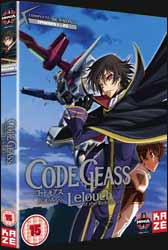|
Click here to return to the main site. DVD Review
On August 10th of the year 2010 the Holy Empire of Britannia began a campaign of conquest, its sights set on Japan. Operations were completed in one month thanks to Britannia's deployment of new mobile humanoid armour vehicles dubbed Knightmare Frames. Japan's rights and identity were stripped away, the once proud nation now referred to as Area 11. Its citizens, Elevens, are forced to scratch out a living while the Britannian aristocracy lives comfortably within their settlements. Pockets of resistance appear throughout Area 11, working towards independence for Japan. Lelouch, an exiled Imperial Prince of Britannia posing as a student, finds himself in the heart of the ongoing conflict for the island nation. Through a chance meeting with a mysterious girl named C.C., Lelouch gains his Geass, the power of the king. Now endowed with absolute dominance over any person, Lelouch may finally realize his goal of bringing down Britannia from within...! Code Geass aired on Japanese TV in 2006 and - after a troubled production that saw the final two episodes delayed by months - 2007, becoming an overwhelming hit with audiences to the extent that a second season was greenlit just before the first ended. With its influences - the evergreen Mobile Suit Gundam, the then-recently filmed V for Vendetta, and mostly plainly of all the hit manga and anime Death Note - worn on its sleeve, it's both easy to see the reasons for its success and to deride its lack of originality. Code Geass transcends its derivative nature and overt hamminess, though, to become a vastly entertaining anime series. It's a pleasure to see an anime so accomplished at playing to its strengths as Code Geass. From the outset the show demonstrates it's working on a broad canvas, as the fascist Britannian Empire crushes plucky little Japan to plunder its precious resources and subdue the population, a calculated appeal to the audience's patriotic instincts that's ironic considering how neatly it inverts Japan's own behaviour towards its Asian neighbours in the early 20th century. In a further twist the Japanese resistance appear for the most part ineffectual and disorganised, only transforming into a effective fighting force under the cultish leadership of the vengeful exiled prince Lelouch, as he takes on the persona of masked revolutionary Zero. Lelouch himself is a superbly arresting lead character, with a gift for manipulation as big as his talent for melodrama; his ruthless persona, despite the show's repeated attempts to evoke sympathy for his motives, is easy to read on the level of pure villainy, with his declared aim of making a peaceful world for his sister engulfed by his evident Oedipus complex and fits of irrational fury. Against Lelouch's absurdly larger-than-life characterization, his antagonist Suzaku - the 'White Knight' to Lelouch's 'Black Prince' - can't help but come off as rather stiff and uninteresting, at least until their mutual determination to see through their chosen paths begins to take its toll. The rest of the cast, dragged along in their wake, would ordinarily pale in comparison if not for the exciting and eccentric array of characters on display - Starbuck-like mecha pilot Kallen, warrior princess Cornelia and the enigmatic C.C. are among the most memorable female roles in recent anime. It's a shame the show's typical tendency towards exploitative fanservice undermines their on-screen achievements. The show changes gear with wild unevenness throughout, with thrilling action set-pieces - the mecha battles in particular are brilliantly staged - and witty dialogue punctuated by scenes of daft comedy seemingly necessitated by the high school backdrop that even a series this assured can't bring itself to do without. Even so, the scenes of Lelouch pursuing a cat that has run off with his Zero mask, or a mecha throwing a gigantic pizza at a school festival, are so silly and earnest they become part of the show's fabric as much as the political drama and bloodshed. The direction, music and cast are all top flight, with particular praise due to Jun Fukuyama as Lelouch/Zero, whose vocal performance (replete with unmistakable evil laugh) is magnificent and pushes the series towards brilliance. Even despite its uneven nature and moments of uninspired writing, I can't bring myself to say anything truly negative about Code Geass Series 1; it's one of the most sheerly enjoyable shows of the past few years and correctly deserves to be seen as a classic. If you've missed seeing it until now, Kaze's excellent re-release (complete with subtitled commentary tracks from the Japanese cast and crew, a feature that many more English-language exports could benefit from including) is well worth your time. A great start to 2013's anime schedule. 8 Richard Hunt |
|---|

